Mental Health: Psychopharmacology and Patient Education
VerifiedAdded on 2021/04/17
|5
|1234
|39
Practical Assignment
AI Summary
This assignment focuses on mental health and psychopharmacology, specifically addressing a patient's concerns regarding their husband's antidepressant medication, Cymbalta. The solution provides patient counseling, explaining the role of serotonin, common side effects like intimacy issues, and the potential for withdrawal symptoms. It also discusses the use of St. John's Wort, cautioning against its use due to potential risks and interactions with Cymbalta. Furthermore, the assignment acknowledges the benefits of exercise for depression but recommends professional guidance. The solution emphasizes the importance of consulting with the patient's GP for dosage adjustments and alternative treatment options, ensuring a comprehensive and informed approach to mental health care, along with relevant references.
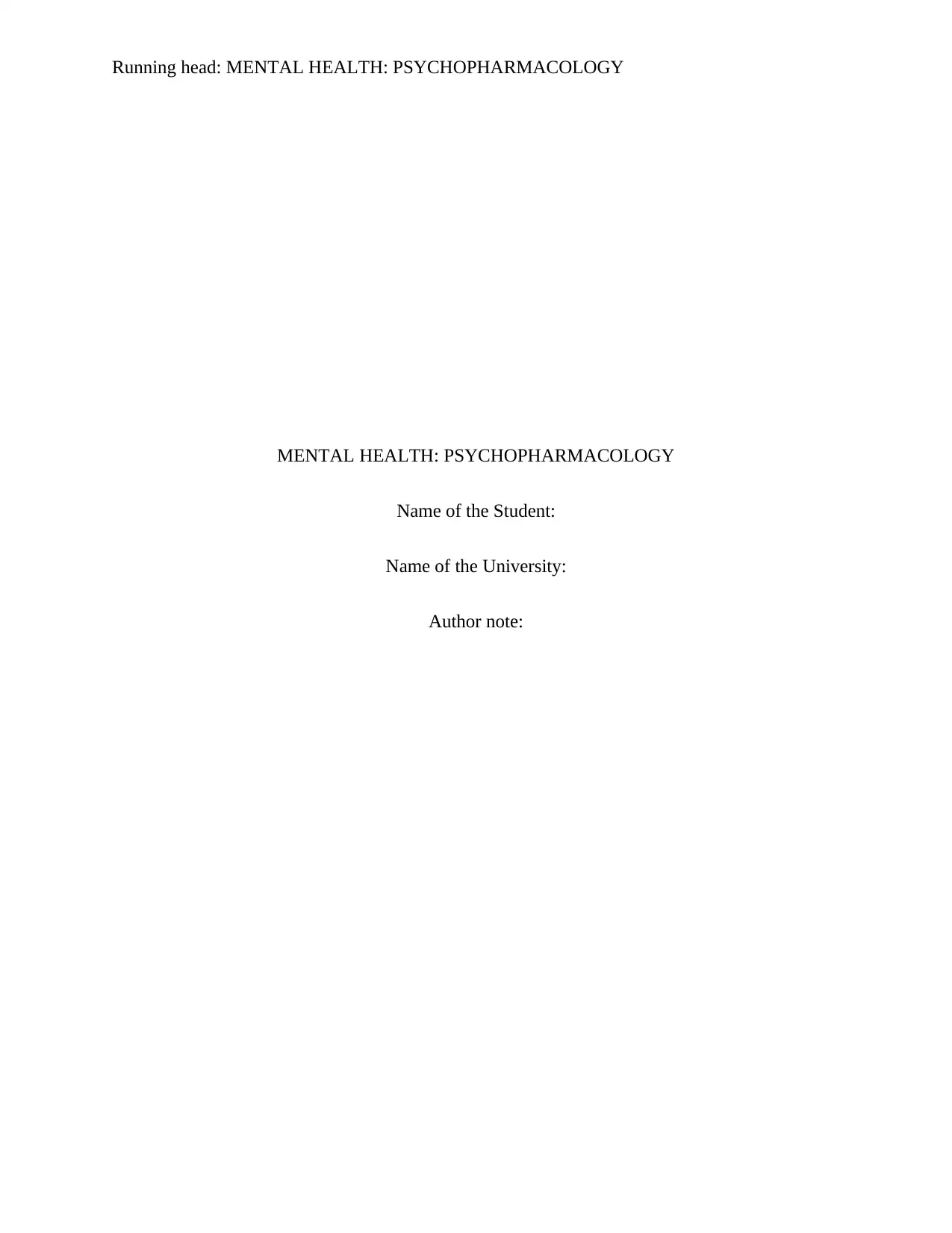
Running head: MENTAL HEALTH: PSYCHOPHARMACOLOGY
MENTAL HEALTH: PSYCHOPHARMACOLOGY
Name of the Student:
Name of the University:
Author note:
MENTAL HEALTH: PSYCHOPHARMACOLOGY
Name of the Student:
Name of the University:
Author note:
Paraphrase This Document
Need a fresh take? Get an instant paraphrase of this document with our AI Paraphraser
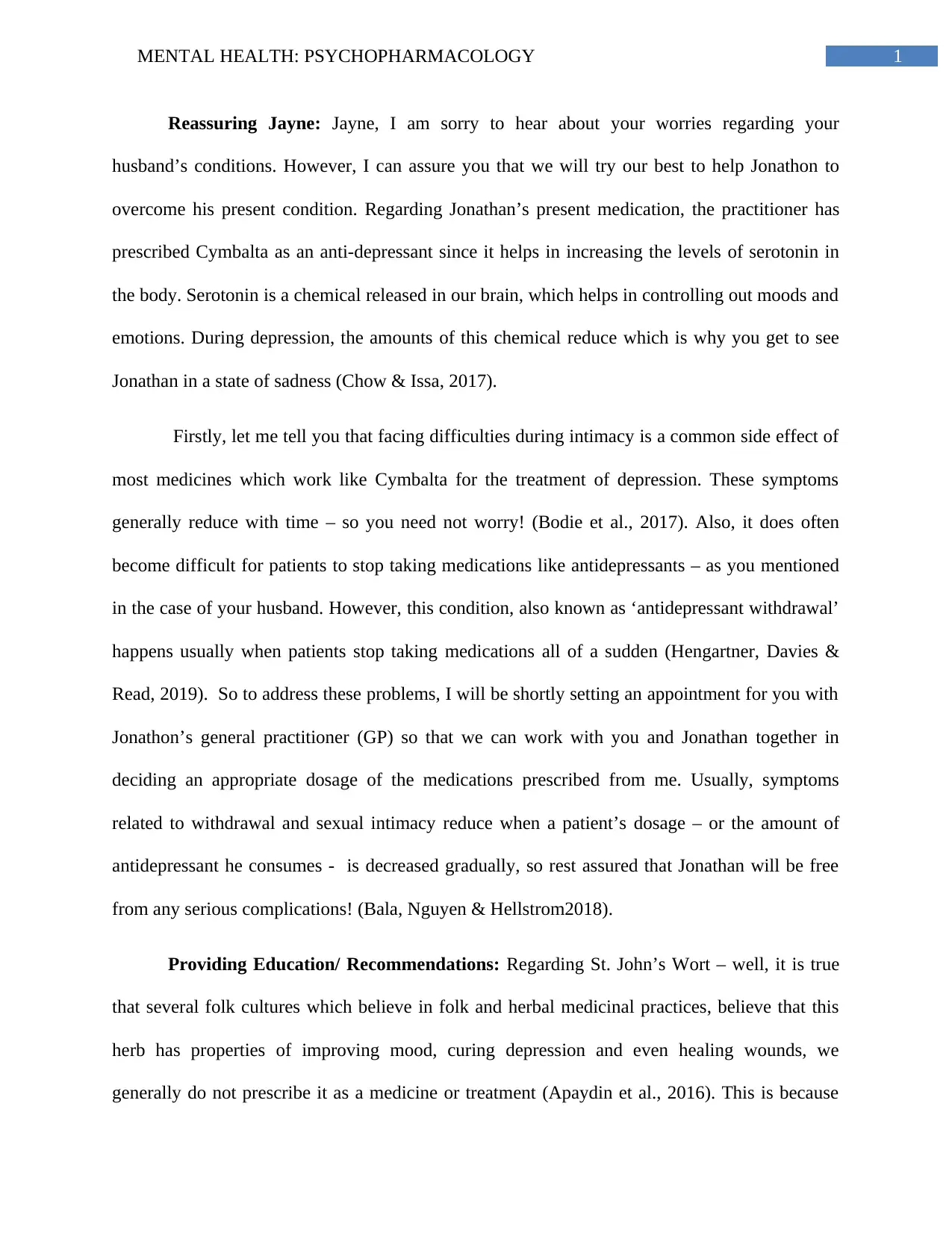
1MENTAL HEALTH: PSYCHOPHARMACOLOGY
Reassuring Jayne: Jayne, I am sorry to hear about your worries regarding your
husband’s conditions. However, I can assure you that we will try our best to help Jonathon to
overcome his present condition. Regarding Jonathan’s present medication, the practitioner has
prescribed Cymbalta as an anti-depressant since it helps in increasing the levels of serotonin in
the body. Serotonin is a chemical released in our brain, which helps in controlling out moods and
emotions. During depression, the amounts of this chemical reduce which is why you get to see
Jonathan in a state of sadness (Chow & Issa, 2017).
Firstly, let me tell you that facing difficulties during intimacy is a common side effect of
most medicines which work like Cymbalta for the treatment of depression. These symptoms
generally reduce with time – so you need not worry! (Bodie et al., 2017). Also, it does often
become difficult for patients to stop taking medications like antidepressants – as you mentioned
in the case of your husband. However, this condition, also known as ‘antidepressant withdrawal’
happens usually when patients stop taking medications all of a sudden (Hengartner, Davies &
Read, 2019). So to address these problems, I will be shortly setting an appointment for you with
Jonathon’s general practitioner (GP) so that we can work with you and Jonathan together in
deciding an appropriate dosage of the medications prescribed from me. Usually, symptoms
related to withdrawal and sexual intimacy reduce when a patient’s dosage – or the amount of
antidepressant he consumes - is decreased gradually, so rest assured that Jonathan will be free
from any serious complications! (Bala, Nguyen & Hellstrom2018).
Providing Education/ Recommendations: Regarding St. John’s Wort – well, it is true
that several folk cultures which believe in folk and herbal medicinal practices, believe that this
herb has properties of improving mood, curing depression and even healing wounds, we
generally do not prescribe it as a medicine or treatment (Apaydin et al., 2016). This is because
Reassuring Jayne: Jayne, I am sorry to hear about your worries regarding your
husband’s conditions. However, I can assure you that we will try our best to help Jonathon to
overcome his present condition. Regarding Jonathan’s present medication, the practitioner has
prescribed Cymbalta as an anti-depressant since it helps in increasing the levels of serotonin in
the body. Serotonin is a chemical released in our brain, which helps in controlling out moods and
emotions. During depression, the amounts of this chemical reduce which is why you get to see
Jonathan in a state of sadness (Chow & Issa, 2017).
Firstly, let me tell you that facing difficulties during intimacy is a common side effect of
most medicines which work like Cymbalta for the treatment of depression. These symptoms
generally reduce with time – so you need not worry! (Bodie et al., 2017). Also, it does often
become difficult for patients to stop taking medications like antidepressants – as you mentioned
in the case of your husband. However, this condition, also known as ‘antidepressant withdrawal’
happens usually when patients stop taking medications all of a sudden (Hengartner, Davies &
Read, 2019). So to address these problems, I will be shortly setting an appointment for you with
Jonathon’s general practitioner (GP) so that we can work with you and Jonathan together in
deciding an appropriate dosage of the medications prescribed from me. Usually, symptoms
related to withdrawal and sexual intimacy reduce when a patient’s dosage – or the amount of
antidepressant he consumes - is decreased gradually, so rest assured that Jonathan will be free
from any serious complications! (Bala, Nguyen & Hellstrom2018).
Providing Education/ Recommendations: Regarding St. John’s Wort – well, it is true
that several folk cultures which believe in folk and herbal medicinal practices, believe that this
herb has properties of improving mood, curing depression and even healing wounds, we
generally do not prescribe it as a medicine or treatment (Apaydin et al., 2016). This is because
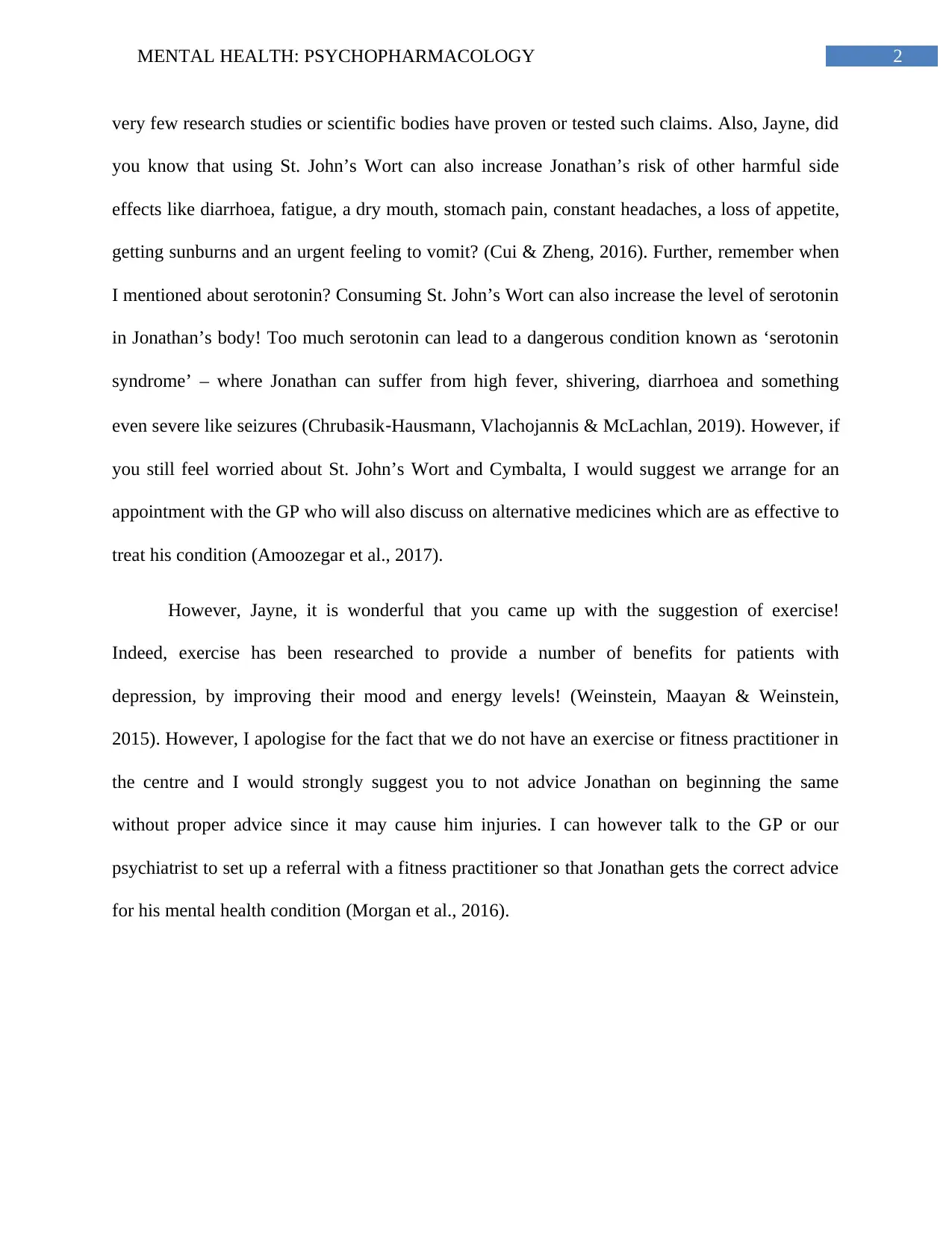
2MENTAL HEALTH: PSYCHOPHARMACOLOGY
very few research studies or scientific bodies have proven or tested such claims. Also, Jayne, did
you know that using St. John’s Wort can also increase Jonathan’s risk of other harmful side
effects like diarrhoea, fatigue, a dry mouth, stomach pain, constant headaches, a loss of appetite,
getting sunburns and an urgent feeling to vomit? (Cui & Zheng, 2016). Further, remember when
I mentioned about serotonin? Consuming St. John’s Wort can also increase the level of serotonin
in Jonathan’s body! Too much serotonin can lead to a dangerous condition known as ‘serotonin
syndrome’ – where Jonathan can suffer from high fever, shivering, diarrhoea and something
even severe like seizures (Chrubasik‐Hausmann, Vlachojannis & McLachlan, 2019). However, if
you still feel worried about St. John’s Wort and Cymbalta, I would suggest we arrange for an
appointment with the GP who will also discuss on alternative medicines which are as effective to
treat his condition (Amoozegar et al., 2017).
However, Jayne, it is wonderful that you came up with the suggestion of exercise!
Indeed, exercise has been researched to provide a number of benefits for patients with
depression, by improving their mood and energy levels! (Weinstein, Maayan & Weinstein,
2015). However, I apologise for the fact that we do not have an exercise or fitness practitioner in
the centre and I would strongly suggest you to not advice Jonathan on beginning the same
without proper advice since it may cause him injuries. I can however talk to the GP or our
psychiatrist to set up a referral with a fitness practitioner so that Jonathan gets the correct advice
for his mental health condition (Morgan et al., 2016).
very few research studies or scientific bodies have proven or tested such claims. Also, Jayne, did
you know that using St. John’s Wort can also increase Jonathan’s risk of other harmful side
effects like diarrhoea, fatigue, a dry mouth, stomach pain, constant headaches, a loss of appetite,
getting sunburns and an urgent feeling to vomit? (Cui & Zheng, 2016). Further, remember when
I mentioned about serotonin? Consuming St. John’s Wort can also increase the level of serotonin
in Jonathan’s body! Too much serotonin can lead to a dangerous condition known as ‘serotonin
syndrome’ – where Jonathan can suffer from high fever, shivering, diarrhoea and something
even severe like seizures (Chrubasik‐Hausmann, Vlachojannis & McLachlan, 2019). However, if
you still feel worried about St. John’s Wort and Cymbalta, I would suggest we arrange for an
appointment with the GP who will also discuss on alternative medicines which are as effective to
treat his condition (Amoozegar et al., 2017).
However, Jayne, it is wonderful that you came up with the suggestion of exercise!
Indeed, exercise has been researched to provide a number of benefits for patients with
depression, by improving their mood and energy levels! (Weinstein, Maayan & Weinstein,
2015). However, I apologise for the fact that we do not have an exercise or fitness practitioner in
the centre and I would strongly suggest you to not advice Jonathan on beginning the same
without proper advice since it may cause him injuries. I can however talk to the GP or our
psychiatrist to set up a referral with a fitness practitioner so that Jonathan gets the correct advice
for his mental health condition (Morgan et al., 2016).
⊘ This is a preview!⊘
Do you want full access?
Subscribe today to unlock all pages.

Trusted by 1+ million students worldwide
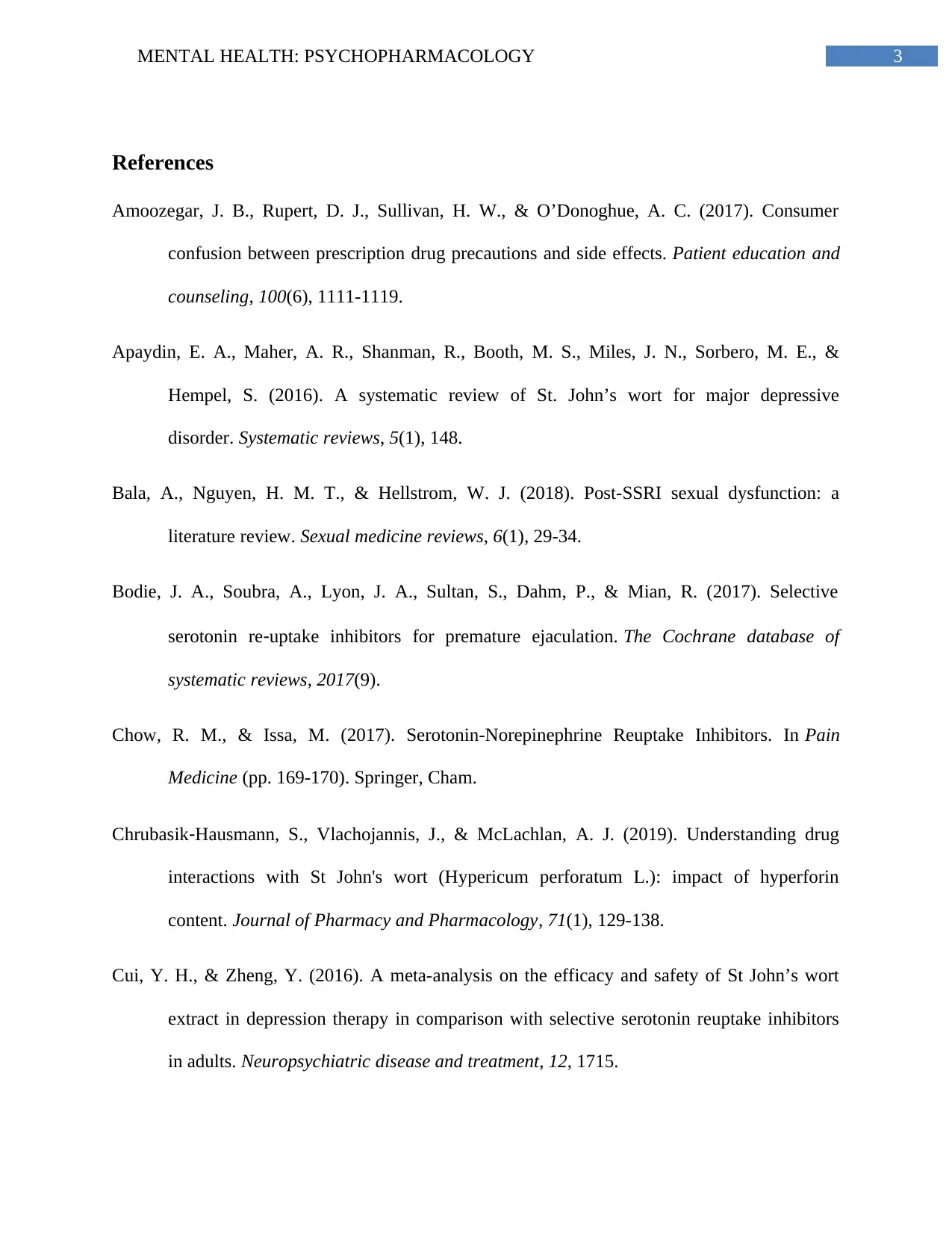
3MENTAL HEALTH: PSYCHOPHARMACOLOGY
References
Amoozegar, J. B., Rupert, D. J., Sullivan, H. W., & O’Donoghue, A. C. (2017). Consumer
confusion between prescription drug precautions and side effects. Patient education and
counseling, 100(6), 1111-1119.
Apaydin, E. A., Maher, A. R., Shanman, R., Booth, M. S., Miles, J. N., Sorbero, M. E., &
Hempel, S. (2016). A systematic review of St. John’s wort for major depressive
disorder. Systematic reviews, 5(1), 148.
Bala, A., Nguyen, H. M. T., & Hellstrom, W. J. (2018). Post-SSRI sexual dysfunction: a
literature review. Sexual medicine reviews, 6(1), 29-34.
Bodie, J. A., Soubra, A., Lyon, J. A., Sultan, S., Dahm, P., & Mian, R. (2017). Selective
serotonin re‐uptake inhibitors for premature ejaculation. The Cochrane database of
systematic reviews, 2017(9).
Chow, R. M., & Issa, M. (2017). Serotonin-Norepinephrine Reuptake Inhibitors. In Pain
Medicine (pp. 169-170). Springer, Cham.
Chrubasik‐Hausmann, S., Vlachojannis, J., & McLachlan, A. J. (2019). Understanding drug
interactions with St John's wort (Hypericum perforatum L.): impact of hyperforin
content. Journal of Pharmacy and Pharmacology, 71(1), 129-138.
Cui, Y. H., & Zheng, Y. (2016). A meta-analysis on the efficacy and safety of St John’s wort
extract in depression therapy in comparison with selective serotonin reuptake inhibitors
in adults. Neuropsychiatric disease and treatment, 12, 1715.
References
Amoozegar, J. B., Rupert, D. J., Sullivan, H. W., & O’Donoghue, A. C. (2017). Consumer
confusion between prescription drug precautions and side effects. Patient education and
counseling, 100(6), 1111-1119.
Apaydin, E. A., Maher, A. R., Shanman, R., Booth, M. S., Miles, J. N., Sorbero, M. E., &
Hempel, S. (2016). A systematic review of St. John’s wort for major depressive
disorder. Systematic reviews, 5(1), 148.
Bala, A., Nguyen, H. M. T., & Hellstrom, W. J. (2018). Post-SSRI sexual dysfunction: a
literature review. Sexual medicine reviews, 6(1), 29-34.
Bodie, J. A., Soubra, A., Lyon, J. A., Sultan, S., Dahm, P., & Mian, R. (2017). Selective
serotonin re‐uptake inhibitors for premature ejaculation. The Cochrane database of
systematic reviews, 2017(9).
Chow, R. M., & Issa, M. (2017). Serotonin-Norepinephrine Reuptake Inhibitors. In Pain
Medicine (pp. 169-170). Springer, Cham.
Chrubasik‐Hausmann, S., Vlachojannis, J., & McLachlan, A. J. (2019). Understanding drug
interactions with St John's wort (Hypericum perforatum L.): impact of hyperforin
content. Journal of Pharmacy and Pharmacology, 71(1), 129-138.
Cui, Y. H., & Zheng, Y. (2016). A meta-analysis on the efficacy and safety of St John’s wort
extract in depression therapy in comparison with selective serotonin reuptake inhibitors
in adults. Neuropsychiatric disease and treatment, 12, 1715.
Paraphrase This Document
Need a fresh take? Get an instant paraphrase of this document with our AI Paraphraser
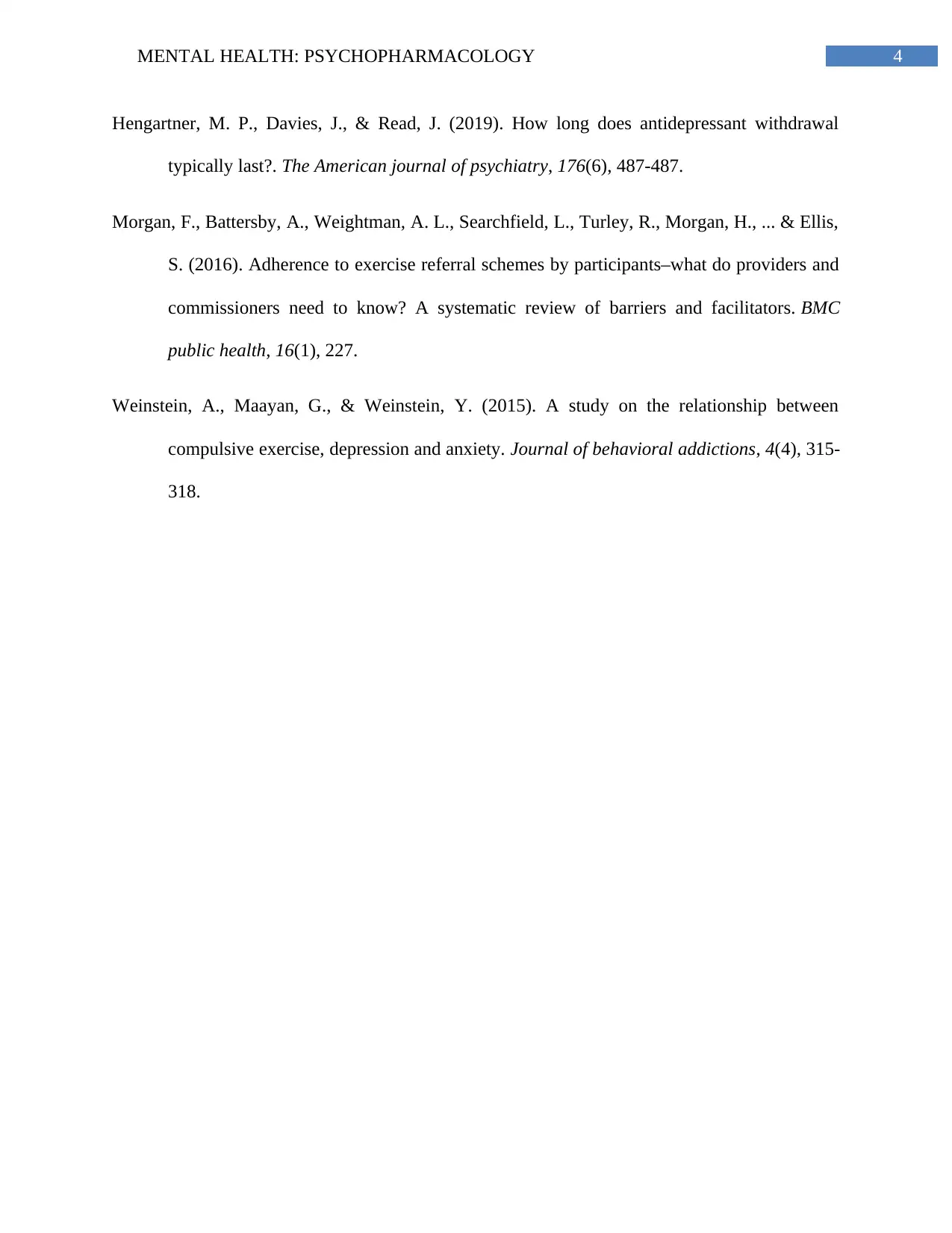
4MENTAL HEALTH: PSYCHOPHARMACOLOGY
Hengartner, M. P., Davies, J., & Read, J. (2019). How long does antidepressant withdrawal
typically last?. The American journal of psychiatry, 176(6), 487-487.
Morgan, F., Battersby, A., Weightman, A. L., Searchfield, L., Turley, R., Morgan, H., ... & Ellis,
S. (2016). Adherence to exercise referral schemes by participants–what do providers and
commissioners need to know? A systematic review of barriers and facilitators. BMC
public health, 16(1), 227.
Weinstein, A., Maayan, G., & Weinstein, Y. (2015). A study on the relationship between
compulsive exercise, depression and anxiety. Journal of behavioral addictions, 4(4), 315-
318.
Hengartner, M. P., Davies, J., & Read, J. (2019). How long does antidepressant withdrawal
typically last?. The American journal of psychiatry, 176(6), 487-487.
Morgan, F., Battersby, A., Weightman, A. L., Searchfield, L., Turley, R., Morgan, H., ... & Ellis,
S. (2016). Adherence to exercise referral schemes by participants–what do providers and
commissioners need to know? A systematic review of barriers and facilitators. BMC
public health, 16(1), 227.
Weinstein, A., Maayan, G., & Weinstein, Y. (2015). A study on the relationship between
compulsive exercise, depression and anxiety. Journal of behavioral addictions, 4(4), 315-
318.
1 out of 5
Your All-in-One AI-Powered Toolkit for Academic Success.
+13062052269
info@desklib.com
Available 24*7 on WhatsApp / Email
![[object Object]](/_next/static/media/star-bottom.7253800d.svg)
Unlock your academic potential
Copyright © 2020–2025 A2Z Services. All Rights Reserved. Developed and managed by ZUCOL.